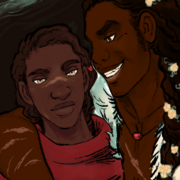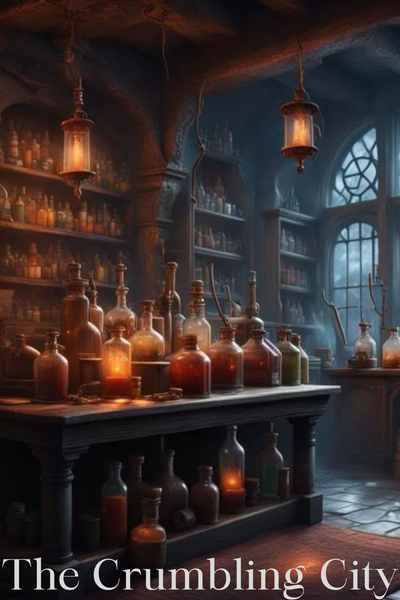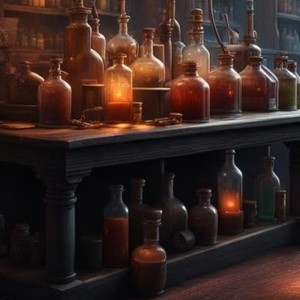Cities share many odd qualities. Among their oddest is the ability to surround a person with thousands of others, then render them entirely alone. No matter how many hundreds of thousands of souls they passed, one could shut their heart and not feel connected to a single one of them, if they so chose. In a city, other humans could be viewed as mere traffic. Cora took full advantage of that anonymity, wearing it like armour. Or perhaps a strong travelling cloak. They didn’t want to get mixed up in matters that didn’t concern them, believing their heart to be too small to be used empathising with strangers.
The metaphorical travelling cloak did have its weaknesses, one of which was laid plain as Cora crossed underneath the bridge. Armour had no effect against the smell of rotting flesh, and Cora’s skin crawled. They weren’t squeamish - they had grown up in the city - but the severed heads of traitors always made them shudder.
On that unseasonably hot day, there were more heads than usual. Some were fresh, even though it hadn’t been a hanging day. One was young, possessing the sort of youth that scares mothers everywhere, the pride that screams of an upcoming fall. Despite the premature lines on his face from the gaol, he was young. Even the crows pecking out his eyes looked a little put out, as though the government was undermining the nobility of their profession. Cora tore their eyes away and walked on fast.
The city was just as usual, i.e. chaotic and impossible to predict. People had driven themselves mad trying. It was filthy, crowded and full of thieves, who ranged from starving urchins to well-turned-out bankers. As usual. To one whose knowledge of the city was surface level. And to Cora. Cora wanted to believe that everything was just as usual. The idea of the city changing terrified them. In their life, change was the harbinger of suffering.
So, on that chill Autumn evening, they focused on everything that was usual. A newspaper boy shouted the lurid details of a murder - some country lady and her companion. A constable, Drallum’s finest, faced off against a child pickpocket with the innocent expression of a choirboy. Someone hawked honey-roasted peanuts across from someone else advertising ‘Demon Skulls - the genuine article at cut rates’. It was a picture of normalcy.
Except for where it wasn’t. Except for the cracks that Cora couldn’t help but notice. Like all the constables. Not the usual bumbling oafs in blue, who most street thieves felt a sort of mocking affection for. These were new constables, men in black uniforms. Cora had never seen one draw a weapon, but they had a hunch it was more than a baton and a whistle. It seemed, in recent days, that Cora ran into one every time they turned a corner. They never started trouble, but they watched, the threat they posed unmistakable. Cora had an uncomfortable sense that they were waiting for something. They hoped they wouldn’t be around to see those coiled springs released.
Normal, except that the thieves and prostitutes and gamblers were more cautious. Raids, before the new constables, had been a sort of pantomime. Three or four constables solemnly filed into a parlour full of well-dressed women looking the very picture of innocence. They made a big show of looking under cushions or behind dressers, and of finding nothing. Then they solemnly filed out again. These raids were different. Brutal, and random. Even wealth, which in Drallum allowed you to sidestep any law you want, was scant protection. Anyone found engaging in ‘immoral activities’ was thrown in gaol, or strung up on the hill with a bag over their head.
Cora shook themself. The city changed. It was, after all, a city. Governments shifted, kings got bored, everyone liked the idea of ‘law and order’. This was no different from every other time some official had gotten ideas above their station and tried to purge the city of freaks. It would last a few weeks and die down, like all those other times. They would keep their head down and implore their more hot-headed friends to do the same, because that was all they could do. They rationalised as they walked, ignoring the gnawing unease in their stomach. They hoped it was hunger, and knew it wasn’t.
Cora shut the door of the shop behind them and enjoyed the first moment of peace they’d had in hours. The shop with the little attic room above it was their pride and joy, and a testament to their stubborn survival against the odds. It was quiet (apart from the strange noises the pipes made, and the knocking at all hours of the night from their nocturnal friends and the occasional screaming) and scrupulously clean.
It was a magic shop. Not a big one, those were expensive and liable to be raided. It sold potions. Love potions, strawberry-flavoured liquors that would, at worst, give the drinker courage to confess their feelings. Bundles of dried herbs, which made one smell of herbs. Those were what sold best, and they were safe. Guaranteed sellers, harmless enough to fly under the radar. But locked up in their cabinets were rows of bottles that they aimed never to sell. Poisons and healing draughts (remarkably similar). Potions for forgetting and remembering. They synthesised them out of curiosity, hoping they’d never have need of them.
It was a quiet day. They sat behind the counter, mask on to protect themself from fumes, with a particularly stubborn sort of tumbleweed containing a particularly nasty poison. They began the painstaking work of despining and crushing and extracting. Their back ached from hunching over, the smell was awful, and they were happy as could be. They were so lost in the process (and slightly delirious from the poison) that at first they didn’t hear the frantic knocking.











Comments (9)
See all